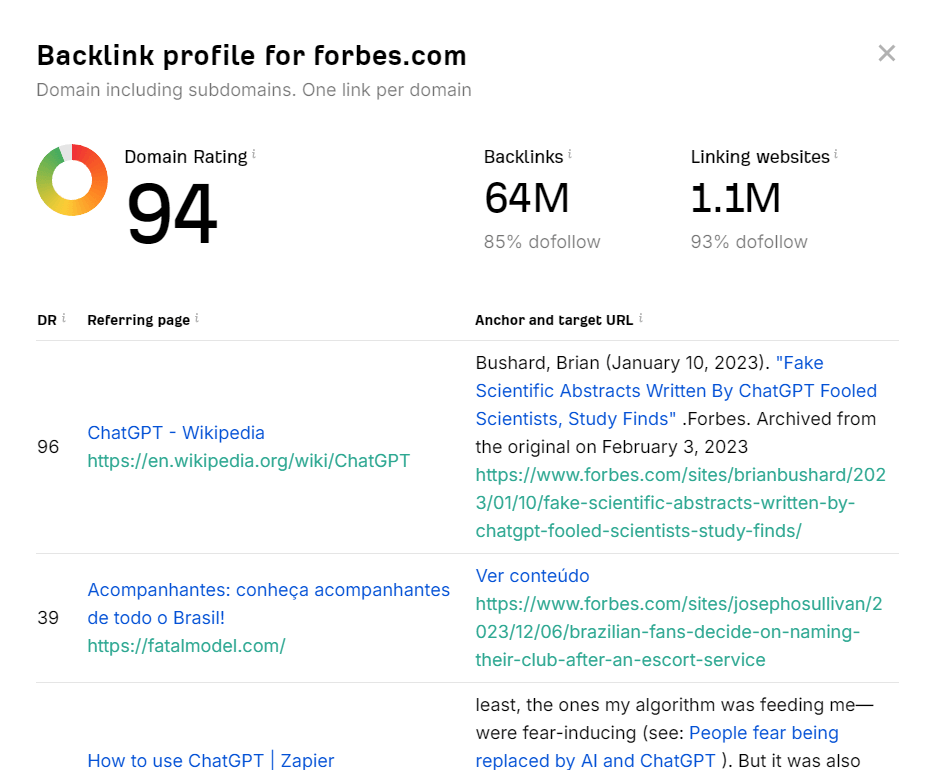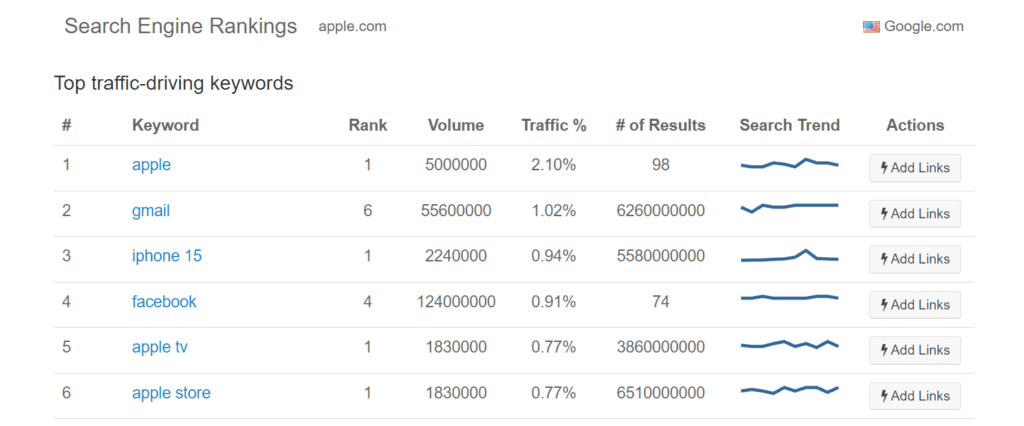If you’re just starting a new website or trying to increase traffic on an existing page, you might have overlooked the importance of backlinks for SEO. Backlinking is a tried-and-tested SEO strategy that can multiply your website’s traffic if executed well. Use this Coalition Technologies guide to learn more about backlinks and the best ways to use them for SEO.

Table of Contents
SEO & Backlinks: The Basics
Backlinks are links directed towards a website from other websites. They are commonly referred to as inbound links. Backlinks are essential for search engine optimization (SEO) because they act like a vote of confidence for a website. A more significant number of high-quality backlinks makes ranking well on search results pages easier.
An example can help us better understand what backlinks are. Consider a blog post about fiber optic internet. A detailed blog like this generally includes statistics linking to a reputable website. In this case, the source website has gained a backlink from the fiber optic internet blog post.
Why are Backlinks So Important in SEO?
Top-ranked SERP websites tend to have 3.8x more backlinks than their lower-ranked competitors. Here’s what makes backlinks a must-have for SEO:
- Build Authority & Trustworthiness: Search engines use backlinks to judge how other users and websites perceive and value your content. When a website links to your web page, it implies it trusts and endorses your content. Naturally, your content must meet a high-quality standard to be worth a link.
Businesses that understand what backlinks are used for in SEO will try to increase the number of backlinks from reputed and authoritative sources, building up their website’s authority. - Improve Search Rankings: Search engines use backlinks to understand your web pages and how the linked pages relate to each other contextually. Once a page links to your website, it signals what your page is about and its relevance for a set of keywords and topics. If you can demonstrate your page’s relevance for a set of keywords, ranking can be much easier.

Experts will capitalize on this SEO benefit of backlinks by using descriptive anchor text for their links, including targeted keywords for that particular topic.
- Build Brand Awareness: Learning what backlinks are is integral to increasing your page’s brand awareness. The proper backlink can introduce your brand to a new and receptive audience. Businesses often pay to post guest contributions on popular trade outlets, generating backlinks from a website guaranteed to reach their target audience.
Now that we know why backlinks are so crucial for SEO, we can break down the different types of links.
The Main Types of Backlinks
Any two links look similar, but each type of backlink serves a unique purpose.
- Follow Links: Follow or dofollow links pass on authority and relevance to the linked website. Dofollow links pass through PageRank, affecting the authority of the linked page and potentially affecting its overall ranking.
- Nofollow Links: Nofollow links contain a (rel=“nofollow”) attribute that prevents the link from going through PageRank. It’s okay if you’re not an SEO expert, you just need to know that nofollow links essentially work as a vote of no confidence, informing Google that the original linker does not vouch for the linked page.
Experts generally agreed that nofollow links were a non-factor in search engine rankings, but updates to Google’s algorithm have reopened that debate. A 2020 update turned nofollow links into a hint for crawling and indexing purposes. Despite these changes, the overall impact of nofollow links on rankings remains dubious.
- Sponsored Links: Sponsored links include a (rel=“sponsored”) attribute, telling Google the link has been paid for. Businesses use sponsored links to comply with Google’s strict spam policies. While these links don’t count as a vote of confidence, they can help advertise your website.
- Editorial Links: This is the gold standard for discovering the types of backlinks good for SEO. Editorial links link back to your website, embedded in high-quality content pieces. For example, a consulting agency conducting a valuable survey about market conditions and posting it online would naturally generate many editorial backlinks, with other pages using it as a source.
Why are Guest Blogging Backlinks Important for SEO?
Backlinks from guest blogging are links from other websites when you write and publish a guest post for them. Over 75% of editors plan to post up to 10 guest posts weekly.
Guest posts are popular because they allow businesses to rack up links quickly. Editorial link building, on the other hand, can be a slow process. A high-quality piece of content is not guaranteed to generate links.
Newcomers learning what backlinks are should note that guest posting isn’t a shortcut. Reputed domains like Forbes maintain high editorial standards, and your content still needs to provide value. Generating spammy links through other outlets can end up getting your website blacklisted.
What Makes For a Good Backlink in SEO?
Understanding why backlinks are essential for SEO is just one part of the puzzle. Keep these factors in mind as you build those links.
- Relevance: Search engines consider backlinks from websites relevant to your website’s niche to be more valuable. For example, if your store is about selling cooking utensils, a link from a reputed lifestyle blog would be relevant. Understanding what relevant backlinks are can differentiate high-ranking websites from the competition.
- Anchor Text: Anchor text is a link’s highlighted and clickable text. Anchor text helps with SEO by showing search engines what a page is about. Backlinks with anchor text that includes relevant keywords and phrases can help improve your website’s rankings for those keywords.
- Quality > Quantity: Less is more when it comes to SEO. Getting too many backlinks too quickly can be seen as spammy by search engines, and a strategy can help you build those links gradually over time. If you’re learning what backlinks are, the ultimate goal is to mix quality with quantity, generating many high-quality backlinks.
- Authoritative Sources: Backlinks from high-authority websites are more valuable than those from low-authority sites. Search engines consider pages with high domain authority (DA) more trustworthy, and getting a backlink from these sites can significantly improve your website’s rankings.

If you know why backlinks are essential in SEO, you should also remember the penalties that can come with chasing after spammy links. We recommend using a professional SEO agency or at least an SEO tool to help you with your link-building. Popular SEO tools include backlink checkers that can analyze a page’s domain authority and help you find link-building opportunities.
What Are The Best Ways To Create Backlinks for SEO?
- Quality Content: It’s worth investing the time and effort to create high-value blogs or infographics for your readers. There is no guarantee that your content will generate links quickly, but maintaining an authoritative presence can help you project your brand’s presence and demonstrate authority.
- Guest Posting: Take the time to build connections and find guest posting opportunities for your page. You can start your research by looking for websites specializing in your niche and allowing contributions. Take care to adhere to their editorial standards; ignoring them could mean losing out on a valuable traffic source.
- Broken Links: Broken link building involves looking for broken links on pages and replacing those links with your content. This tactic might sound like looking for a needle in a haystack, but SEO tools can help you here. Look for websites operating in your niche. Once you’ve found a broken link, you can create content for it and offer your link as a replacement to the website owners.
Strengthen Your SEO Strategy
Understanding backlinks is excellent, but keeping track of thousands of link-building opportunities and managing them is challenging for most businesses. Working with an experienced digital marketing agency lets you focus on your business and leave the links to the experts. Coalition Technologies uses tried-and-tested SEO strategies to increase web traffic and sales for growing companies. Contact us today for a free consultation!
Frequently Asked Questions (FAQs)
Why are backlinks important for SEO?
Learning what backlinks are can help you:
- Increase your website’s authority and credibility, as they signal that other websites trust and recommend your content.
- Drive organic traffic to your website by improving your ranking for relevant keywords and topics.
- Expand your audience and reach by exposing your website to new and diverse groups of users who may be interested in your products. With other SEO techniques, businesses can capitalize on new customer segments to proliferate.
What are the different types of backlinks?
Backlinks are generally divided into two main subgroups: dofollow and nofollow links. Dofollow backlinks pass SEO value from the linking website to your website, while nofollow backlinks do not. Both types of backlinks serve a purpose and are valuable. For example, social media links are primarily no-follow but can help new users connect with your business. Once you know what backlinks are, you can use each backlink type to boost your traffic.


